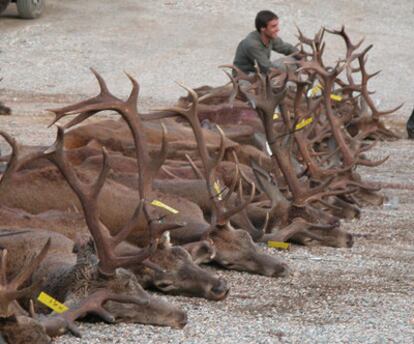In search of deer hunters
Excess population is threatening flora and cattle in reserves
In the area that surrounds Monfragüe (Cáceres, Extremadura) the hunters say they have seen deer just meters away from villages. It's easy to believe. Park Director Ángel Rodrigúez admits to "a degree of overpopulation" in the Mediterranean forest. "There are around 20,000 animals in 18,000 hectares." Another 12,000 deer live on privately owned land around the park - 30,000 hectares in total, where hunting is broadly permitted.
The problem is not confined to Cáceres. "There is a surplus throughout Spain and I would say the whole northern hemisphere," says Christian Gortázar, researcher at Spain's Higher Council for Scientific Research (CSIC). "The population is growing between 20 and 30 percent every year and hunting needs to increase by the same proportion." But the shotguns only get to around 15 to 18 percent, according to Gortázar.
The equilibrium between species, including humans, broke down a long time ago
"No one wants to be a hunter these days. Young people go to bed at the same time we get up to go hunting"
As with most hoofed creatures, numbers of wild boar are also growing too fast. There aren't many trusted censuses, but scientists agree on the maximum density: a hectare can support between 0.2 and 0.4 deer. Worries about overpopulation are well founded. Excess animals can spread diseases such as tuberculosis to cattle, and also threaten plant life.
The equilibrium between species, including humans, broke down a long time ago. Now there are deer but no wolves, or too many rabbits and not enough hunters. National parks are used to this problem. "We are islands and these things happen, it's common even on big reserves like in Africa. There are some where you must intervene to control numbers; such as Monfragüe, or Cabañeros, where people have always hunted," explains Juan Carranza, professor of veterinary science at Extremadura university.
But right now hunting is on the wane. It's expensive and the crisis has had an impact. "Expensive expeditions have dropped 40 percent since 2008," explains head of research at the Spanish Hunting Federation, José Luis Garrido. He says the sport is in terminal decline. "No one wants to be a hunter these days. Young people go to bed on Saturdays at the same time we get up to go hunting."
Wary of wolves
Some have suggested reintroducing wolves in the park in Extremadura. But wolves need very large territories and could pose a problem for livestock. "Flocks are not closely watched and wolves would eat the sheep," explains Rodríguez, the park director.
This leaves hunting, which in national parks acquires euphemistic names such as "actions" or "capture," because they don't fell wild boar or deer for sport or profit but rather to put the brakes on a population that tends to get out of hand. In 2010 hunters killed 520 animals on 3,000 hectares of land.
Allowing hunting in the park would provoke an outcry from ecologists. Rodríguez insists the problem lies outside the park. He hopes that new regional regulations will bring some order as they will "allow more hunting" than the current quotas.
Garrido, from the hunting federation, recognizes that game hunters tend to seek out good antlers and avoid females and adolescents, the animals targeted in culls. But ecologist groups accuse hunters of not fulfilling their quotas outside the park because game meat is less profitable these days.
Gortazár adds that a lack of livestock has helped deer spread. And while discordant voices argue about the best course of action, the deer population grows and grows.

Tu suscripción se está usando en otro dispositivo
¿Quieres añadir otro usuario a tu suscripción?
Si continúas leyendo en este dispositivo, no se podrá leer en el otro.
FlechaTu suscripción se está usando en otro dispositivo y solo puedes acceder a EL PAÍS desde un dispositivo a la vez.
Si quieres compartir tu cuenta, cambia tu suscripción a la modalidad Premium, así podrás añadir otro usuario. Cada uno accederá con su propia cuenta de email, lo que os permitirá personalizar vuestra experiencia en EL PAÍS.
¿Tienes una suscripción de empresa? Accede aquí para contratar más cuentas.
En el caso de no saber quién está usando tu cuenta, te recomendamos cambiar tu contraseña aquí.
Si decides continuar compartiendo tu cuenta, este mensaje se mostrará en tu dispositivo y en el de la otra persona que está usando tu cuenta de forma indefinida, afectando a tu experiencia de lectura. Puedes consultar aquí los términos y condiciones de la suscripción digital.








































